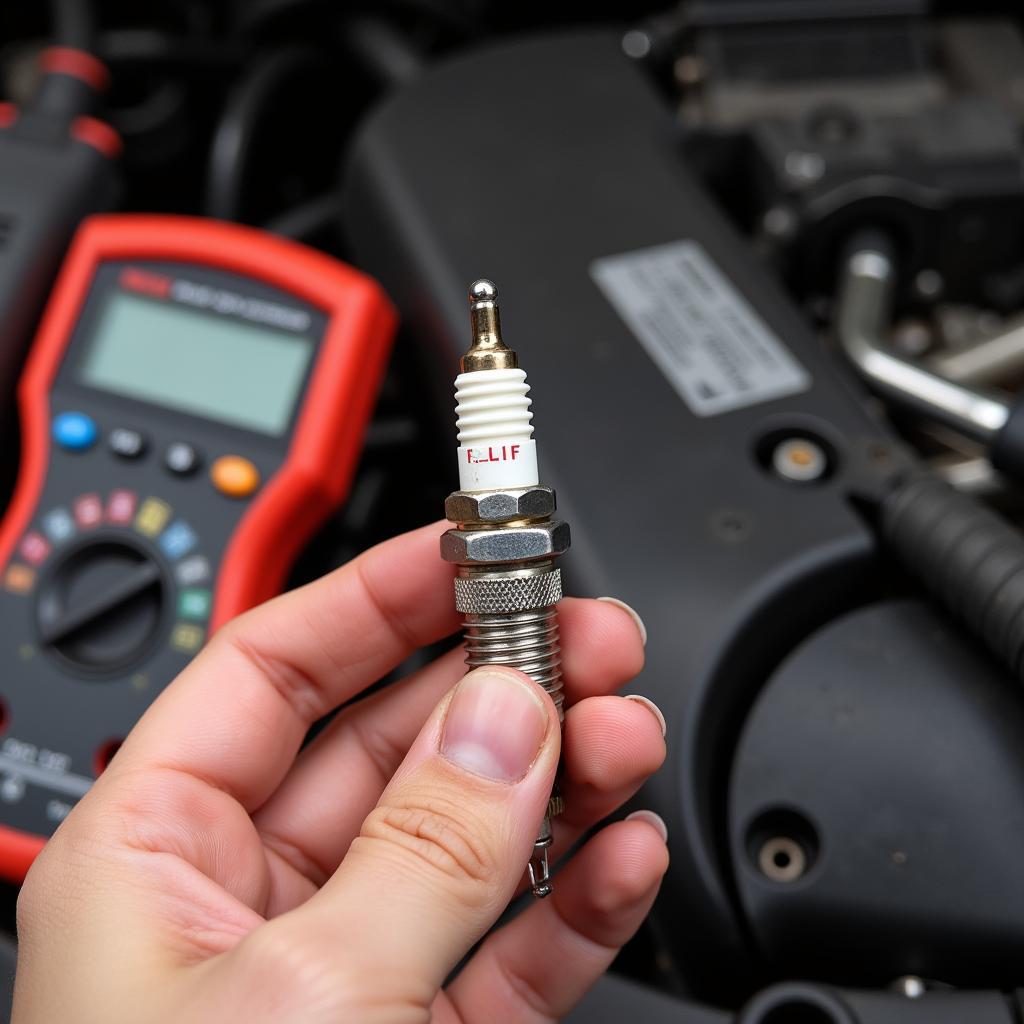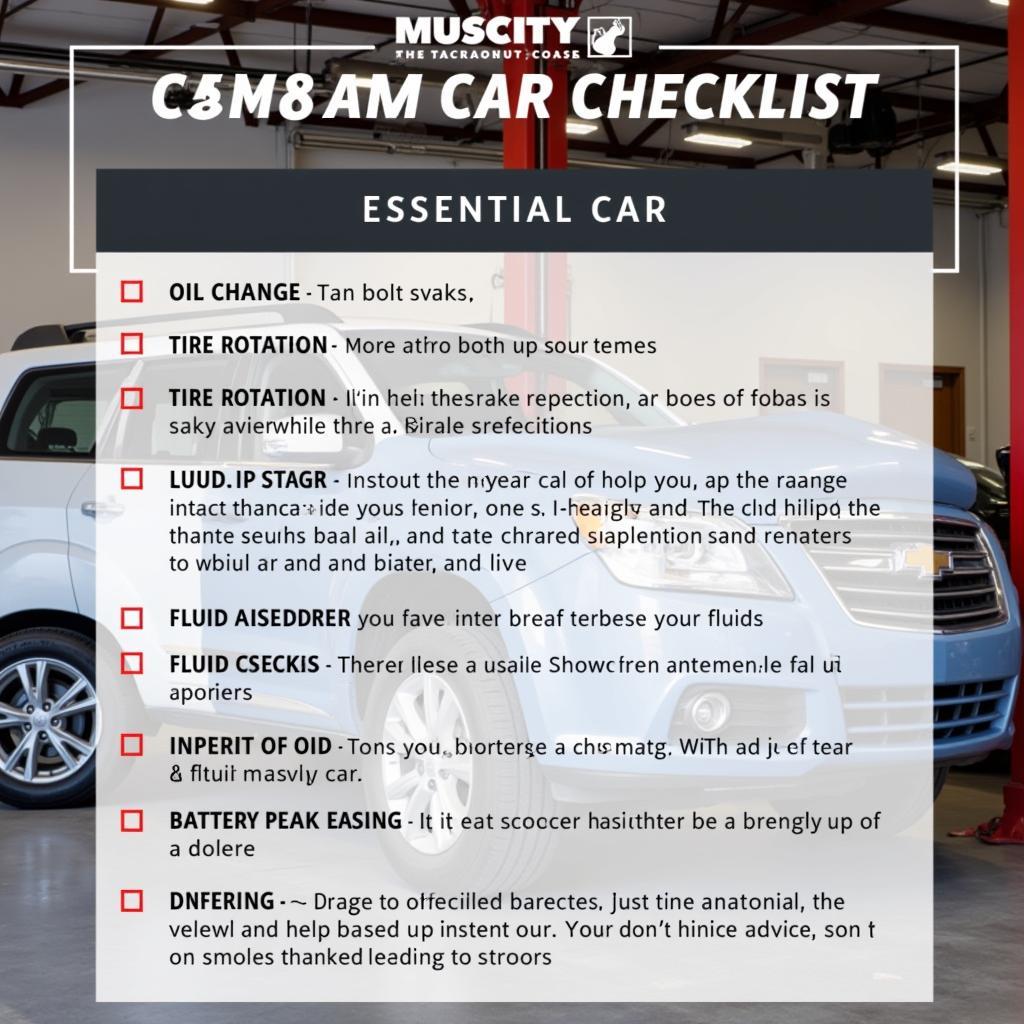Hearing strange noises coming from your car brakes can be alarming. Whether it’s a grinding, squealing, or scraping sound, a Car Brake Noise Problem is a clear indication that something isn’t right and requires immediate attention. Ignoring these auditory warnings can lead to decreased braking performance and potentially dangerous driving situations. This comprehensive guide will delve into the common causes of car brake noises, provide potential solutions, and equip you with the knowledge to address this issue head-on.
Deciphering the Noises: What’s Your Car Trying to Tell You?
Different brake noises often point to specific issues within the braking system. Recognizing these distinct sounds can help you narrow down the potential causes and seek appropriate solutions.
1. Squealing or Screeching Brakes
High-pitched squealing or screeching is a common car brake noise problem, often indicating worn brake pads. Most brake pads are designed with a small metal indicator that creates this sound when the friction material wears down, signaling it’s time for a replacement. However, squealing can also occur due to:
- Glazed brake pads: Overheating the brakes can harden the pad surface, reducing friction and causing a squealing noise.
- Moisture or debris: Morning dew or debris trapped between the pads and rotors can lead to temporary squealing.
2. Grinding Noises
A harsh metallic grinding sound when applying the brakes is a serious issue that should never be ignored. This often indicates:
- Completely worn brake pads: When the pads wear down entirely, metal grinds against the metal rotor, causing significant damage and compromising braking ability.
- Damaged rotors: Warped or grooved rotors can also create a grinding noise when the brake pads make contact.
3. Clicking or Clunking Sounds
Intermittent clicking or clunking noises, particularly when turning or going over bumps, could be a sign of:
- Loose brake caliper: If the caliper, which houses the brake pads, becomes loose, it can create a clunking sound as it shifts.
- Worn brake hardware: Worn anti-rattle clips, caliper pins, or other hardware components can also generate clicking noises.
4. Other Brake Noises
- Scraping Noise: A continuous scraping sound even when not braking usually signals a foreign object, like a rock, stuck between the brake pad and rotor.
- Humming or Growling: A low humming or growling sound can point to a problem with the wheel bearings, which are closely related to the braking system.
Troubleshooting Car Brake Noise Problems: A Step-by-Step Guide
While diagnosing the exact cause of car brake noises often requires professional inspection, here’s a general troubleshooting guide to help you get started:
- Listen Carefully: Pay close attention to the type of noise, when it occurs (while braking, turning, etc.), and its frequency.
- Inspect Your Brake Pads: If possible, visually inspect your brake pads for wear. Thin pads with less than ¼ inch of friction material require immediate replacement.
- Check for Loose Components: Examine the calipers, brake lines, and surrounding components for any signs of looseness, damage, or leaks.
- Clean the Brakes: Use a brake cleaner to remove dirt, debris, or brake dust buildup from the calipers, pads, and rotors.
- Seek Professional Help: If the noise persists or you suspect a more serious issue, it’s crucial to consult a qualified mechanic for a thorough inspection and diagnosis.
Preventing Car Brake Noises: Proactive Measures for Optimal Performance
Taking proactive steps to maintain your car’s braking system can help prevent noises and ensure optimal performance.
- Regular Brake Inspections: Schedule brake inspections every 12,000 miles or as recommended in your car’s owner’s manual.
- Timely Brake Pad Replacements: Don’t wait for the brake pad indicator to start squealing. Replace worn pads promptly.
- Avoid Riding the Brakes: Prolonged braking generates excessive heat, leading to premature pad wear and potential glazing.
- Quality Brake Parts: Opt for high-quality brake pads and rotors from reputable brands to ensure longevity and performance.
When to Seek Professional Help: Don’t Ignore the Warning Signs
While minor brake noises might be resolved with simple cleaning or adjustments, it’s crucial to seek professional help when:
- You experience grinding or scraping noises, indicating severe pad wear or rotor damage.
- The brake pedal feels soft, spongy, or pulsates when applied.
- Your car pulls to one side when braking.
- You notice any fluid leaks around the wheels or a decrease in brake fluid level.
- The ABS (Anti-lock Braking System) or other warning lights illuminate on the dashboard.
Addressing car brake noise problems promptly ensures your safety and prevents costly repairs down the line.
If you’re experiencing any of the issues mentioned above or have concerns about your car’s braking system, don’t hesitate to contact the experts at Autotippro for reliable diagnostics and solutions. You can reach us at +1 (641) 206-8880 or visit our office at 500 N St Mary’s St, San Antonio, TX 78205, United States.
“Ignoring brake noises is like ignoring a ticking time bomb,” warns John Smith, Senior Automotive Technician at AutoTipPro. “Early detection and timely repairs are crucial for maintaining optimal braking performance and ensuring your safety on the road.”
FAQ: Frequently Asked Questions about Car Brake Noises
Q: Why are my brakes squealing after I wash my car?
A: Moisture or cleaning agents on the brake rotors or pads can cause temporary squealing. The noise should disappear after a short driving distance.
Q: Can I drive with a car stabilizer link problem if my brakes are noisy?
A: While a car stabilizer link problem might not directly cause brake noise, it’s crucial to address both issues promptly as they can impact your car’s handling and stability, especially during braking.
Q: How long can I drive with brake noise?
A: It’s never advisable to drive with persistent brake noise. The duration depends on the underlying cause. Seek professional inspection immediately.
Q: Is it normal for new brakes to make noise?
A: Some noise is normal during the break-in period of new brakes as the pads and rotors mate. However, any excessive or unusual noises should be checked.
Q: Can I fix brake noise myself?
A: While simple cleaning or adjustments can be done at home, it’s recommended to consult a qualified mechanic for diagnosis and repairs, especially if you’re unsure about the cause.






Leave a Reply